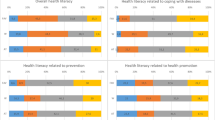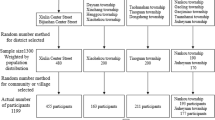ABSTRACT
BACKGROUND
Individual health literacy is an established predictor of individual health outcomes. Community-level health literacy may also impact individual health, yet limited research has simultaneously considered the influence of individual and community health literacy on individual health.
OBJECTIVE
The study goal was to determine if community health literacy had an independent relationship with individual self-reported health beyond individual health literacy.
DESIGN
We used data from the 2008 and 2010 Hawai‘i Health Survey, a representative statewide telephone survey. Multilevel models predicted individual self-reported health by both individual and community health literacy, controlling for relevant individual-level (education, race/ethnicity, gender, poverty, insurance status, age, and marital status) and community-level variables (community poverty and community education).
PARTICIPANTS
The sample included 11,779 individuals within 37 communities.
MAIN MEASURES
Individual health literacy was defined by validated self-reported measurement. Communities were defined by zip code combinations. Community health literacy was defined as the percentage of individuals within a community reporting low health literacy. Census data by ZIP Code Tabulation Areas provided community-level variables.
KEY RESULTS
In descriptive results, 18.2 % self-reported low health literacy, and 14.7 % reported self-reported poor health. Community-level low health literacy ranged from 5.37 % to 35.99 %. In final, multilevel models, both individual (OR: 2.00; 95 % CI: 1.63–2.44) and community low health literacy (OR: 1.02; 95 % CI: 1.00–1.03) were significantly positively associated with self-reported poor health status. Each percentage increase of average low health literacy within a community was associated with an approximately 2 % increase in poor self-reported health for individuals in that community. Also associated with poorer health were lower educational attainment, older age, poverty, and non-White race.
CONCLUSIONS
Both individual and community health literacy are significant, distinct correlates of individual general health status. Primary care providers and facilities should consider and address health literacy at both community and individual levels.
Similar content being viewed by others
REFERENCES
Berkman ND, Sheridan SL, Donahue KE, Halpern DJ, Crotty K. Low health literacy and health outcomes: an updated systematic review. Ann Intern Med. 2011;155:97–107.
Paasche-Orlow MK, Wolf MS. The causal pathways linking health literacy to health outcomes. Am J Health Behav. 2007;31(Suppl 1):S19–26.
von Wagner C, Steptoe A, Wolf MS, Wardle J. Health literacy and health actions: a review and a framework from health psychology. Health Educ Behav. 2009;36:860–77. Epub 2008 Aug 26.
Kaphingst KA, Goodman M, Pyke O, Stafford J, Lachance C. Relationship between self-reported racial composition of high school and health literacy among community health center patients. Health Educ Behav. 2012;39:35–44.
Martin LT, Ruder T, Escarce JJ, et al. Developing predictive models of health literacy. J Gen Intern Med. 2009;24:1211–6.
Fiscella K, Tancredi D, Franks P. Adding socioeconomic status to Framingham scoring to reduce disparities in coronary risk assessment. Am Heart J. 2009;157:988–94.
Gottlieb L, Sandel M, Adler NE. Collecting and applying data on social determinants of health in health care settings. JAMA Intern Med. 2013;173:1017–20.
IOM (Institute of Medicine). Innovations in Health Literacy Research: Workshop Summary. Washington, DC: The National Academies Press; 2011.
Koh HK, Brach C, Harris LM, Parchman ML. A proposed ‘health literate care model’ would constitute a systems approach to improving patients’ engagement in care. Health Aff. 2013;32:357–67.
Koh HK, Berwick DM, Clancy CM, et al. New federal policy initiatives to boost health literacy can help the nation move beyond the cycle of costly ‘crisis care’. Health Aff. 2012;31:434–43.
Nielsen-Bohlman L, Panzer AM, Kindig DA, eds. Health literacy: A prescription to end confusion. Washington, DC: National Academies Press; 2004.
Robert SA. Community-level socioeconomic status effects on adult health. J Health Soc Behav. 1998;39:18–37.
Ross CE, Mirowsky J. Neighborhood socioeconomic status and health; context or composition? City Commun. 2008;7:163–79.
Zhang W, McCubbin H, McCubbin L, et al. Education and self-rated health: an individual and neighborhood level analysis of Asian Americans, Hawaiians, and Caucasians in Hawaii. Soc Sci Med. 2010;70:561–9.
Hanchate A. Population-based approaches to assessing health literacy. In Measures of Health Literacy: Workshop Summary. Institute of Medicine (US) Roundtable on Health Literacy. Washington, DC: The National Academies Press (US); 2009.
Lurie N, Martin LT, Ruder T, et al. Estimating and mapping health literacy in the state of Missouri. RAND Working Paper #WR-735. 2009. Available at: www.rand.org/content/dam/rand/pubs/working_papers/2010/RAND_WR735.pdf. Accessed September 9, 2013.
Idler EL, Benyamini Y. Self-rated health and mortality: a review of twenty-seven community studies. J Health Soc Behav. 1997;38:21–37.
Office of Health Status Monitoring (OHSM). Hawai‘i Health Survey (HHS). Hawai‘i Department of Health. Available at: http://health.hawaii.gov/hhs. Accessed September 9, 2013.
Chew LD, Bradley KA, Boyko EJ. Brief questions to identify patients with inadequate health literacy. Fam Med. 2004;36:588–94.
Chew LD, Griffin JM, Partin MR, et al. Validation of screening questions for limited health literacy in a large VA outpatient population. J Gen Intern Med. 2008;23:561–6.
Wallace LS, Rogers ES, Roskos SE, Holiday DB, Weiss BD. Brief report: screening items to identify patients with limited health literacy skills. J Gen Intern Med. 2006;21:874–7.
Sentell T, Baker K, Onaka A, Braun K. Low health literacy and poor health status in Asian Americans and Pacific Islanders in Hawai’i. J Health Commun. 2011;16(Suppl 3):279–94.
Schillinger D, Barton LR, Karter AJ, Wang F, Adler N. Does literacy mediate the relationship between education and health outcomes? A study of a low income-population with diabetes. Public Health Rep. 2006;121:245–54.
Dewalt DA, Berkman ND, Sheridan S, Lohr KN, Pignone MP. Literacy and health outcomes: a systematic review of the literature. J Gen Intern Med. 2004;19:1228–39.
US Department of Health and Human Services. The 2008 HHS Poverty Guidelines. Available at: http://aspe.hhs.gov/poverty/08poverty.shtml. Accessed September 9, 2013.
Hanchate AD, Ash AS, Gazmararian JA, Wolf MS, Paasche-Orlow MK. The Demographic Assessment for Health Literacy (DAHL): A new tool for estimating associations between health literacy and outcomes in national surveys. J Gen Intern Med. 2008;23:1561–6.
Joynt M, Train MK, Robbins BW, Halterman JS, Caiola E, Fortuna RJ. The impact of neighborhood socioeconomic status and race on the prescribing of opioids in emergency departments throughout the United States. J Gen Intern Med. 2013; [Epub ahead of print].
Taggart J, Williams A, Dennis S, et al. A systematic review of interventions in primary care to improve health literacy for chronic disease behavioral risk factors. BMC Fam Pract. 2012;13:49.
Buckley DI, McGinnis P, Fagnan LJ, Mardon R, Johnson M Jr, Dymek C. Clinical Community Relationships Evaluation Roadmap. (Prepared by Westat under Contract No. HHSA 290201000021.) AHRQ Publication No.13 M015EF. Rockville, MD: Agency for Healthcare Research and Quality. 2013.
IOM (Institute of Medicine). Primary Care and Public Health: Exploring Integration to Improve Population Health. Washington, DC: The National Academies Press; 2012.
Acknowledgements
This study was supported by grants from the National Cancer Institute 1R03CA158419 and U54CA153459. Biostatistical support was also partially supported by grants from the National Institute on Minority Health and Health Disparities U54MD007584 and G12MD007601 from the National Institutes of Health.
Conflict of Interest
The authors declare that they do not have a conflict of interest.
Author information
Authors and Affiliations
Corresponding author
Rights and permissions
About this article
Cite this article
Sentell, T., Zhang, W., Davis, J. et al. The Influence of Community and Individual Health Literacy on Self-Reported Health Status. J GEN INTERN MED 29, 298–304 (2014). https://doi.org/10.1007/s11606-013-2638-3
Received:
Revised:
Accepted:
Published:
Issue Date:
DOI: https://doi.org/10.1007/s11606-013-2638-3




